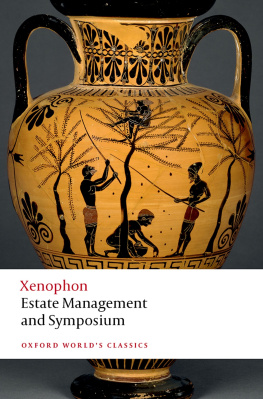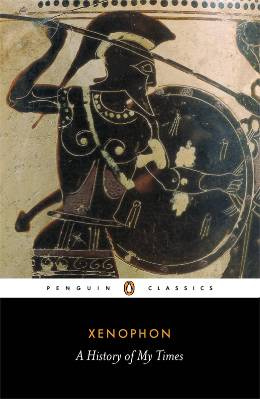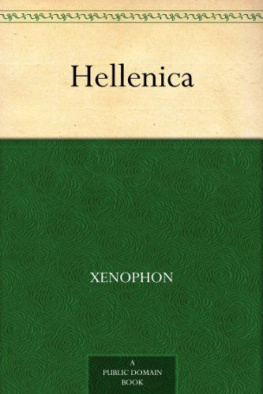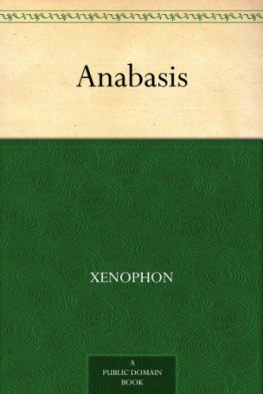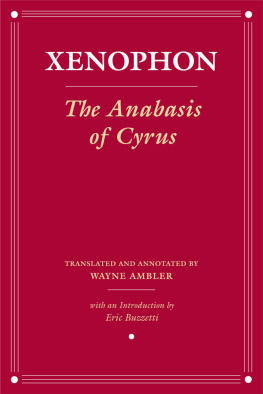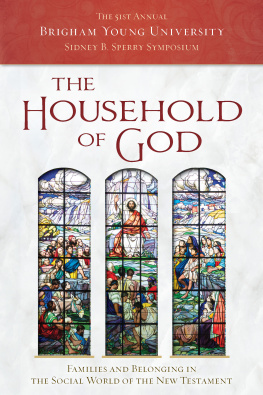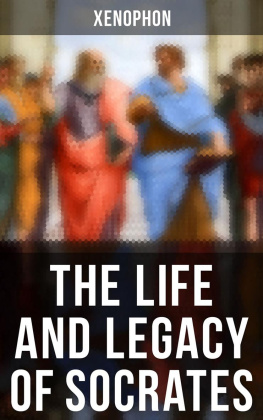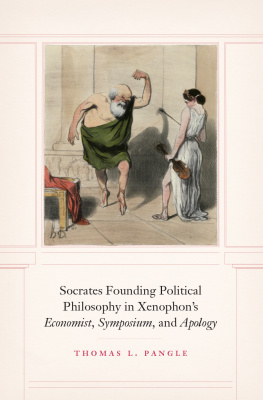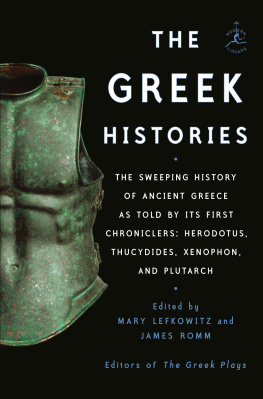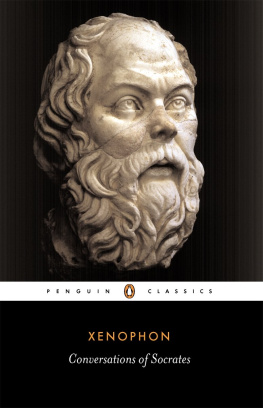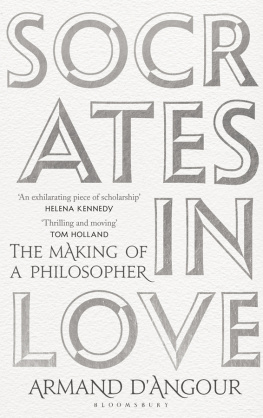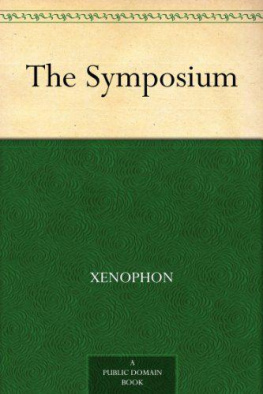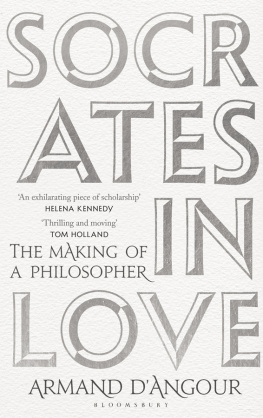Xenophon was born in the early 420s bce to a wealthy Athenian family. He associated in his youth with the philosopher Socrates. In 401 bce , three years after Athenss defeat in the Peloponnesian War, he accepted an invitation to serve with a mercenary army (the famous Ten Thousand) raised by Cyrus, brother of the king of Persia. Cyrus led his army in an unsuccessful attack on his brother. After Cyrus death, Xenophon was one of the leaders of the Ten Thousand in their retreat to the sea. He was later exiled from Athens and settled by the Spartans in the Peloponnese. It was there that he started writing the extraordinarily wide variety of works for which he is now famous: a didactic historical fiction (the Cyropaedia), a contemporary history of Greece (the Hellenica), as well as Socratic dialogues and treatises on economics, hunting, horsemanship, and the Spartan constitution. His most famous work is The Expedition of Cyrus, his account of the march of the Ten Thousand. He died in the late 350s bce .
Anthony Verity was Master of Dulwich College before his retirement. His previous translations include Theocritus, The Idylls (2002), Pindar, The Complete Odes (2007), and Homer, The Iliad (2011) and The Odyssey (2018).
Emily Baragwanath is Associate Professor in the Classics Department at the University of North Carolina at Chapel Hill. Her publications include Motivation and Narrative in Herodotus (2008), articles on the literary techniques employed by the Greek historians, and the co-edited volumes Myth, Truth, and Narrative in Herodotus (2012) and Clio and Thalia: Attic Comedy and Historiography (Histos Supple-ment 2017). At present she is writing a monograph on Xenophons representation of women.
Oxford Worlds Classics
For over 100 years Oxford Worlds Classics have brought
readers closer to the worlds great literature. Now with over 700
titlesfrom the 4,000-year-old myths of Mesopotamia to the
twentieth centurys greatest novelsthe series makes available
lesser-known as well as celebrated writing.
The pocket-sized hardbacks of the early years contained
introductions by Virginia Woolf, T. S. Eliot, Graham Greene,
and other literary figures which enriched the experience of reading.
Today the series is recognized for its fine scholarship and
reliability in texts that span world literature, drama and poetry,
religion, philosophy, and politics. Each edition includes perceptive
commentary and essential background information to meet the
hanging needs of readers.

Great Clarendon Street, Oxford, ox 2 6 dp , United Kingdom
Oxford University Press is a department of the University of Oxford. It furthers the Universitys objective of excellence in research, scholarship, and education by publishing worldwide. Oxford is a registered trade mark of Oxford University Press in the UK and in certain other countries
Translation Anthony Verity 2022
Editorial material Emily Baragwanath 2022
The moral rights of the authors have been asserted
First published as an Oxford Worlds Classics paperback 2022
Impression: 1
All rights reserved. No part of this publication may be reproduced, stored in a retrieval system, or transmitted, in any form or by any means, without the prior permission in writing of Oxford University Press, or as expressly permitted by law, by licence or under terms agreed with the appropriate reprographics rights organization. Enquiries concerning reproduction outside the scope of the above should be sent to the Rights Department, Oxford University Press, at the address above
You must not circulate this work in any other form and you must impose this same condition on any acquirer
Published in the United States of America by Oxford University Press
198 Madison Avenue, New York, NY 10016, United States of America
British Library Cataloguing in Publication Data
Data available
Library of Congress Control Number: 2022931923
ISBN 9780198823513
ebook ISBN 9780192556523
Printed and bound in Great Britain by
Clays Ltd, Elcograf S.p.A.
I am grateful to my Chapel Hill colleagues Sharon James and the late Philip Stadter for their helpful comments on a draft of this Introduction.For Philip Stadter.
E.B.
Contents
Xenophons Life, Times, and Works
Xenophon was born in Athens in the last third of the fifth century bce . Antiquity knew him in the first place as a philosopher. Making Xenophon the subject of one of his Lives of the Philosophers, the ancient biographer Diogenes Laertius described his first encounter with the individual who would most profoundly influence his life and his literary output:
The story goes that Socrates met Xenophon in a narrow street, and that [Socrates] stretched out his staff to bar the way, and inquired where every kind of food was sold. Upon receiving his answer, he put another question, And where do human beings become good and honourable [kaloi kagathoi]? Xenophon was at a loss; Follow me then, said Socrates, and learn. From that time on he was a student of Socrates. He was the first to note down and publish the conversation of Socrates (2.48)
While doubtless apocryphal, the anecdote captures essential aspects of Xenophons Socrates, and of Xenophons preoccupations more generally. The first question, about food, ascribes to Socrates a topic that is real-world, accessible, egalitarian: this basic human need overrides social distinctions. Xenophon in his literary works writes lucidly and accessibly about everyday topics of fundamental importance. He returns time and again to analogies that are familiar and real for his readers: and his expression of ideas is all the more effective for this. Xenophons recording of Socrates assumption in his second question that human beings (anthrpoi) have the potential to become kaloi kagathoigood and honourablecaptures Xenophons interest in and transformation of the concept of gentlemanliness. He sidelines its traditional class connotations in applying it with purely moral reference to people of both genders and across social statuses, as illustrated in the works translated in this volume.
Xenophons are the only Socratic dialogues aside from Platos that survive in full. A Socratic dialogue is a literary work that depicts Socrates in conversation with others. The genre of logoi Skratikoi, or Socratic literature, is probably fictional in essence: what we have are creative soundings, in which an author uses Socrates as the vehicle for exploring his own ideas and preoccupations, albeit anchored to specific historical moments, and peopled with historical individuals. Xenophon plays with this issue of historicity in having the narrator claim to have been an eyewitness to the symposium that is described in one of the works included in this volume: I should like to describe the company I was in when I came to this conclusion (Symposium I.1). Attentive readers will realize that Xenophon the author was a child at the time; he cannot have been present.
Xenophon was not in Athens for Socrates trial before an Athenian democratic jury court in 399 bce , the guilty verdict, and his executionevents that cast a dark shadow over the end of the fifth century, and profoundly shaped the outlooks of all those of Socrates circle. Xenophon had already left to join the Ten Thousand Greek mercenaries who fought alongside the Persian prince Cyrus in his attempt to usurp the throne from his brother, Artaxerxes. Xenophon had discussed this venture with Socrates, who correctly augured that his friendship with Cyrus might create problems for Xenophon in relation to the Athenians (

